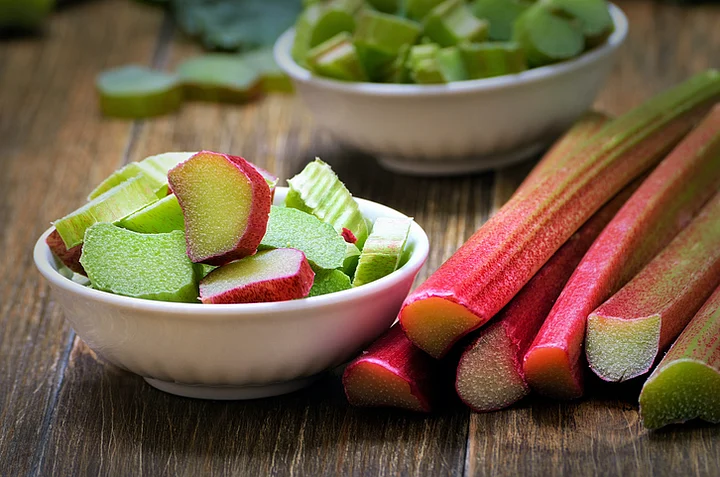Health Benefits of Rhubarb: Rhubarb, scientifically known as Rheum rhabarbarum, is a popular vegetable that is frequently utilized as a fruit in culinary applications and traditional medicine. Although originating in Asia, it can be successfully cultivated in other parts of the world, including the United States. The plant flourishes in cooler climates, as it struggles to endure the heat.
The vibrant red leafstalks rhubarb emerge during the spring, reaching their peak in mid-April. While only the stalks are edible, the leaves contain toxins and high concentrations of oxalic acid. The stalks themselves possess a fleshy, sour, and acidic texture. Although they can be consumed raw, many individuals prefer them cooked.
Rhubarb boasts a rich historical significance, with roots in ancient Chinese medicine. It was also used in ancient Arab, Greek, and Roman civilizations. Today, it is a common ingredient in jams, pies, compotes, and even beverages.
7 Amazing Health Benefits of Rhubarb
Rhubarb is an excellent source of Vitamin K, which plays a vital role in maintaining bone health and facilitating blood clotting. It also contains Vitamin A, which aids in the fight against free radicals that can contribute to skin damage and premature aging.
Rhubarb is abundant in antioxidants and a variety of essential vitamins and minerals, providing a diverse array of health advantages. Let us read about some of the top health benefits of rhubarb below.
1. Enhances Bone Health: Vitamin K, abundantly found in rhubarb, plays a crucial role in keeping the bones healthy and strong. Vitamin K is necessary for bone formation and helps to prevent osteoporosis.
2. Promotes Heart Health: Fiber, another vital component of rhubarb, aids in lowering cholesterol levels and mitigating the risk of heart disease and heart attack. The antioxidants present in rhubarb possess anti-inflammatory properties, further safeguarding against heart-related issues. The high Vitamin K content of this vegetable prevents calcification of blood vessels.
3. Aids in Digestion: The high fiber content in rhubarb ensures smooth digestion by preventing constipation. It contains sennosides which act as natural laxatives. The tannins present in rhubarb have been found to exhibit anti-diarrheal effects.
4. Prevents Cancer: The antioxidants in rhubarb combat free radicals, reducing the risk of oxidative stress and cell damage. These free radical-fighting properties may lower the likelihood of developing certain types of cancer.
5. Helps in Weight Loss: Rhubarb's low-calorie count and high fiber content make it an effective weight loss aid. It keeps you feeling full, curbs cravings, and eventually helps you to stay away from mindless snacking.
6. Prevents Inflammation: The antioxidants in rhubarb combat inflammation, benefiting individuals with systemic inflammatory reaction syndrome. Research suggests that the anti-inflammatory properties of rhubarb extract can enhance wound healing.
7. Lowers Cholesterol: Recent studies have revealed that rhubarb contains chemicals like resveratrol and emodin, which contribute to its role in regulating lipid metabolism and lowering bad cholesterol levels. Additionally, rhubarb stalks are a good source of fiber, which can impact cholesterol levels.
(Disclaimer: Parts of this article were generated by AI and published after the content was editorially modified and verified by a human based on their own judgement and expertise. The Quint does not publish AI-generated content without direct human involvement and oversight).

